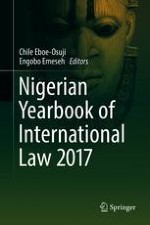2018 | OriginalPaper | Buchkapitel
Promoting Functional Distributive Justice in the Nigerian Sovereign Wealth Fund System: Lessons from Alaska and Norway
verfasst von : Damilola S. Olawuyi, Temitope Tunbi Onifade
Erschienen in: Nigerian Yearbook of International Law 2017
Aktivieren Sie unsere intelligente Suche, um passende Fachinhalte oder Patente zu finden.
Wählen Sie Textabschnitte aus um mit Künstlicher Intelligenz passenden Patente zu finden. powered by
Markieren Sie Textabschnitte, um KI-gestützt weitere passende Inhalte zu finden. powered by
